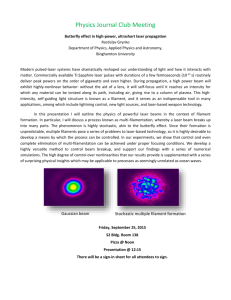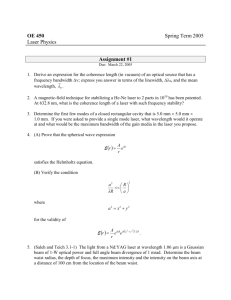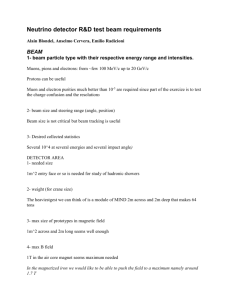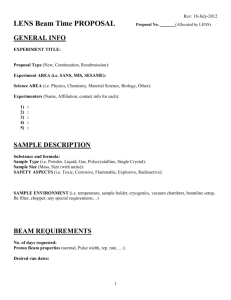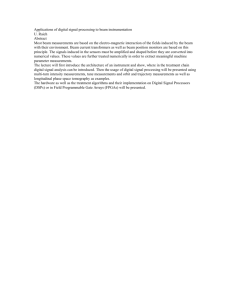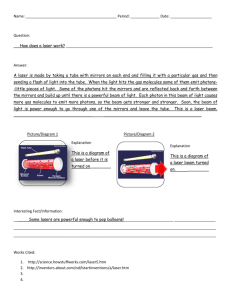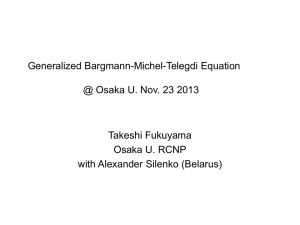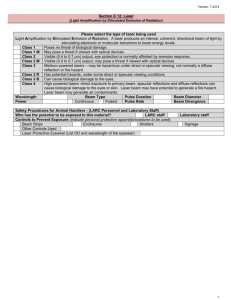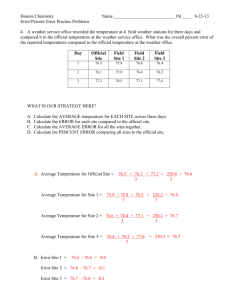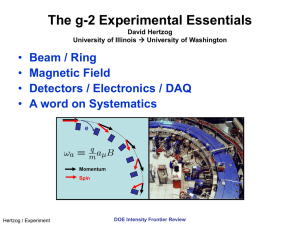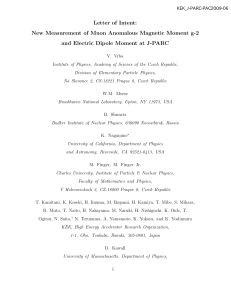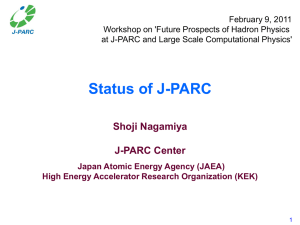taulepton2010_mibe
advertisement
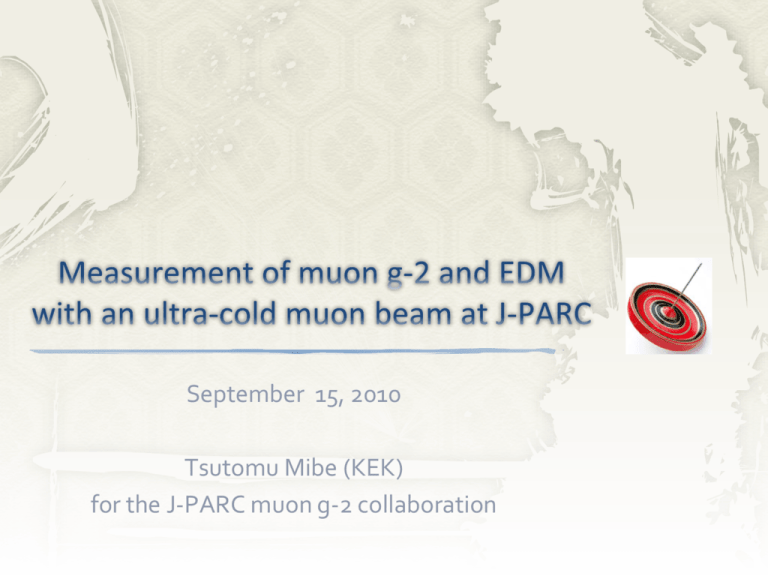
September 15, 2010 Tsutomu Mibe (KEK) for the J-PARC muon g-2 collaboration +e+e- data Experiment Courtesy F. Jergerlehner, arXiv:0902.3360 Confirmation(s) of the discrepancy by future experiments are extremely important. Weitershausen, Schafer, Stockinger-Kim, Stockinger Phys.Rev.D81:093004 (2010) One-loop One-loop + photonic two-loop Contributions from SUSY diagrams covers the E821 deviation. Strong sensitivity to tanb Complementary to LHC searches. Precession frequency e 1 b E E am B am 2 b B m g 1 c 2 c Focusing electric field to confine muons in the storage ring. At the magic momentum 1/(g2-1) = am g = 29.3, p = 3.094 GeV/c E e 1 b E am B am 2 b B m g 1 c 2 c With present upper limit, EDM term can safely be neglected in g-2 measurement. 4 Disadvantages No longer at magic momentum. Muon decays more quickly. … However, experimental apparatus can be compact. Better accuracy of B-field, e.x. 1 ppm local accuracy acheived in MRI magnet Stronger B-field, i.e. more precession Better environmental control temperature, EM noise shielding etc. Completely different systematics than the BNL E821 or FNAL Ok, but how do we deal with the b×E term? Hitachi co. Zero electric field 5 Zero Electric field (E = 0 ) e 1 b E E am B am 2 b B m g 1 c 2 c e am B b B m 2 Equations of spin motion is as simple as at the magic momentum Fine, but how do we confine muons without focusing E-field? Ultra-cold muon beam (pT/p < 10-5) 6 Bird’s eye photo in Feb. 2008 Bird’s eye photo in Feb. 2008 9 3 GeV proton beam ( 333 uA) Graphite target (20 mm) Surface muon beam (28 MeV/c, 4x108/s) Muonium Production (300 K ~ 25 meV⇒2.3 keV/c) Resonant Laser Ionization of Muonium (~106 m+/s) 10 3 GeV proton beam ( 333 uA) Graphite target Silicon Tracker (20 mm) Surface muon beam (28 MeV/c, 4x108/s) Muonium Production (300 K ~ 25 meV⇒2.3 keV/c) 66 cm diameter Super Precision Magnetic Field (3T, ~1ppm local precision) Resonant Laser Ionization of Muonium (~106 m+/s) 11 BNL-E821 Muon momentum Fermilab J-PARC 3.09 GeV/c 0.3 GeV/c 29.3 3 Storage field B=1.45 T 3.0 T Focusing field Electric quad None gamma # of detected m+ decays 5.0E9 1.8E11 1.5E12 # of detected mdecays 3.6E9 - - Precision (stat) 0.46 ppm 0.1 ppm 0.1 ppm 13 71 members (…still evolving) M. Aoki, P. Bakule, B. Bassalleck, G. Beer, A. Deshpande, S. Eidelman, D. E. Fields, M. Finger, M. Finger Jr., Y. Fujirawa, S. Hirota, H. Iinuma, M. Ikegami, K. Ishida, M. Iwasaki, T. Kakurai, T. Kamitani, Y. Kamiya, N. Kawamura, S. Komamiya, K. Koseki, Y. Kuno, O. Luchev, G. Marshall, M. Masuzawa, Y. Matsuda, T. Matsuzaki, T. Mibe, K. Midorikawa, S. Mihara, Y.Miyake, J. Murata, W.M. Morse, R. Muto, K. Nagamine, T. Naito, H. Nakayama, M. Naruki, H. Nishiguchi, M. Nio, D. Nomura, H. Noumi, T. Ogawa, T. Ogitsu, K. Ohishi, K. Oide, A. Olin, N. Saito, N.F. Saito, Y. Sakemi, K. Sasaki, O. Sasaki, A. Sato, Y. Semeritzidis, K. Shimomura, B. Shwartz, P. Strasser, R. Sugahara, K. Tanaka, N. Terunuma, D. Tomono, T.Toshito, K. Ueno, V. Vrba, S. Wada, A. Yamamoto, K. Yokoya, K. Yokoyama, Ma. Yoshida, M. H. Yoshida, and K. Yoshimura 18 Institutions Academy of Science, BNL, BINP, UC Riverside, Charles U., KEK, NIRS, UNM, Osaka U., RCNP, STFC RAL, RIKEN, Rikkyo U., SUNYSB, CRC Tohoku, U. Tokyo, TRIUMF, U. Victoria 6 countries Czech, USA, Russia, Japan, UK, Canada 14 Requrements: 40000 times more muons, and Cooler muon than RAL Requrements: 40000 times more muons, and Cooler muon than RAL 670 times higher surface muon per spill at J-PARC 2.4 x 104/spill 1600 x 104/spill (25 spill/sec) Room temperature target (hot tangsten silica aerogel?) 2000K (15keV/c) 300K (2.3keV/c) 100 times intense laser 1mJ 100mJ 16 RIKEN/KEK/TRIUMF/U.Victoria June 23 ~ July 1, 2010 B= 6-30 Gauss target sample m spin rotation muonium spin rotation L-R asymmetry= AMue-ltcos(Mut+fMu) + Amcos(mt+fm)+A0 Silica aerogel (0.05g/cm3) Mu / m Online data 2 / Mu Vacuum Online data oxygen filled m m me 2 / mm mm 2me Nov. 18 – 30, 2010 NaI m+ beam MWDC e+ MCP(electron capture) simulation target This data will define when and where to shoot the laser. A test experiment at RAL with new laser & target is planned in 2011. Precision Magnet and Beam Injection Muon LINAC * RFQ(?)+DTL+disk loaded 300.80 p[MeV/c] p (MeV/c) 300.60 300.40 300.20 300.00 299.80 299.60 z(mm) 299.40 299.20 -0.80 Hi Power Ly-a Laser System * DFB-LD for stability * Kr-cell to mix/produce 122nm @ 100 u J -0.60 -0.40 -0.20 0.00 0.20 0.40 0.60 Hi-rate Si Tracker • DSSD sensor •SiLC based FEE 21 2009 June : Letter of intent 2009 Dec : Proposal submitted to J-PARC PAC 2010 June : 1st collaboration meeting at KEK 2010 Dec : Conceptual Design Report ... 2015 : First beam A new muon g-2 experiment at J-PARC: Off-magic momentum Ultra-slow muon beam + compact g-2 ring Complementary to g-2@FNAL KEK lab management support R&Ds. There are many progress are being made. 23 Driven by 25 Hz proton beam Time-zero defined by Laser Ionization 24 Detector area Number of sensors 0.12 * number of vanes [m2] 2.9 m2 for 24 vanes 576 mm 580 mm 384 for 24 vanes Number of channels Assume 0.2 mm pitch 115k for 24 vanes* – g-2 silicon tracker *288k for multi-segments readout 25 Support Readout chip DSSD sensors front back 26 Sensor type: Double-sided SSD Chip size : ~12 cm x 6 cm Thickness: 320 um Readout: AC-couple Depletion voltage : 80 V Detector capacitance : ~100pF* Strip pitch : 200um* * to be determined by further studies. p-side From Belle SVD page n-side 27 Inject muon beam with vertical angle to avoid interference in the injection region Deflect PT into PL by radial field Stabilize beam by kicker to “good filed region” Double-kicker or Weak kicker ? Better monitoring/ shimming necessary! H. Iinuma 28 “Active” shimming with current adjustment for separate coils Employed in many MRI From GE Website : 29 Being developed with MRI precision magnet + NMR probes + Hall probes 30 3T- MRI at National Institute of Radiological Science done NMR and Hall Probes (vector) First trial provided < 0.3 ppm stability for NMR (preliminary) To be continued 31 Conceptual Design developed Vibration measurement is ongoing 32 Cryostat wall is assumed to be SUS316 or Al Eddy current time profile is similar to Kicker current After 150 nsec, no remaining effect To be continued 33 Not an extreme, but requires serious efforts Material : NbTi /Copper Cu/Sc ratio : 4 Central Field:3T Peak Field on Cable: 5.4 T Nominal current : 417 A Stored Energy : 23 MJ Inductance : 264.5 H Total mass : 3.7 t Well within current Technology ! 34
